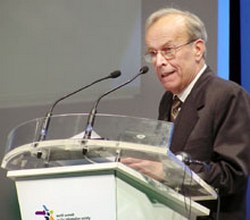Ricardo Alarcon calls to rigorously perform electoral process
- Submitted by: admin
- Havana
- history
- History
- national
- personalities
- Society
- Personalities
- Politics and Government
- 01 / 07 / 2010

Alarcon summed up the act of incorporation of the National Electoral Commission (CEN), held at the José Martí Memorial in Havana city, and in which its members took up their positions, led by Mari Ana Maria Machado, vice president of the Supreme
People's Court and president of the maximum electoral authority in the country.
In the presence of Commander of the Revolution Ramiro Valdes, Alarcon congratulated them and said that shortly (within a period of 30 days), the provincial and municipal committees will be formed in view of the partial elections planned for April and May next year.
He said Raul Castro's call should guide the conduct of the revolutionaries at all times, especially in activities critical for the strengthening of our institutions.
It is the National Commission’s obligation to ensure that the principles and rules of the electoral system are consistently applied across the country, one of the main achievements of the Revolution, to which we will never give up, on which we must strive further, he said.
Alarcon said the full, free and conscious exercise of their rights by all voters, and their voluntary and enthusiastic participation in the voting in April and May reaffirm the true democracy in Cuba, something the country never knew before 1959 and which remains a dream for thousands of millions of people worldwide.
”Because, let us never forget, democracy is the main victim of the dictatorship imposed by global capitalism, whoever doubts it, can take a look at Copenhagen and its grotesque farce,” he illustrated.
The Cuban Parliament President said that strengthening institutions "means perfect democracy and that means to perfect our socialism."
Specifically, it is about raising to higher levels the popular participation, he said.
He noted that Cubans will elect next April through free and secret vote the candidate of their choice, among those that were previously nominated and selected directly by the voters themselves.
Here it is not, as in many other places, an exceptional moment which allows a fraction of citizens apparently choose among candidates often unknown, whose presence on the ballot was decided by machines foreign to the people, said.
Alarcon explained that this is not an election day, but a process that begins when voters verify the accuracy of the electoral registers, they propose to whomever they want as a candidate, and then freely vote for the one they prefer, and finally verify the counting of votes and results at each polling station.
Each of these steps is important and gives room to improve and so that in each of them the leading, conscious and honest role of citizens is authentically expressed, he said.
He requested people to work for each candidate nomination meeting to be an example of true public participation, in which everyone takes part actively to produce a collective reflection, deep, from which the best proposals emerge.
Nothing of routine encounters, to get by fulfilling a formality, but a genuine exercise of direct democracy, he said.
Only then, he said, we will form assemblies truly representative of the popular will, we hope to adequately reflect our population as to gender and ethnic diversity, with delegates whose authority will be increased to the same extent they will arise from the effective role of a mass of conscious voters.
Alarcon said that the delegate shall be primarily able to guide people to their constituents and to promote the initiative and popular control. "They are not, and can not be, officers of bureaucratic officials," he said.
They are political leaders who met the honourable mission of leading the struggle of his people to defend and improve a revolutionary work that resists the siege and aggression, for half a century now.
He said the battle over the economy is to guarantee savings and the wise use of resources, to improve the quality and efficiency of services, to eradicate all manifestations of corruption and indolence, can be only achieved with the workers and the collective action of people, and therefore must be fought in every workplace and neighbourhood.
I congratulate you because it is a responsibility for you that I trust you will know how to assume in this struggle that should only lead to victory; thus Alarcon concluded his words to the members of the National Electoral Commission.
Source: ACN
Comments